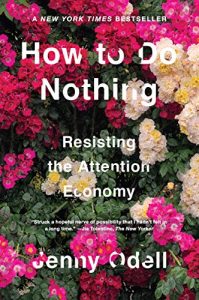Break the cycle by resisting both the social media-driven “attention economy” and the “unforgiving landscape of productivity.”
.
In a recent newsletter from the Baffler (the magazine which seeks to ‘blunt the cutting edge’), editor Kelly Dickinson asked us how we’re all handling the endless stream of negativity:
Reader, are you addled, distracted, tired? Do you lie awake until two, three, four in the morning, staring at your phone, toggling through feed after feed, consuming an endless and constantly refreshing stream of devastating news?
If so, you are not alone but part of a vast communion of doomscrollers. The term—doomscrolling, whose meaning is entirely self-evident—has been around since at least 2018, but it was only this year that Merriam-Webster declared it a word to watch, likely because Covid-induced anxiety has turned us all into obsessive binge consumers of compounding crises, which play out in real time on our social feeds.
The Baffler—The Journal That Blunts the Cutting Edge
She goes on to consider a way out:
How can we loosen news and social media’s vice-grip on our attention? There have been plenty of uninspiring books on the subject, but last spring, Megan Marz reviewed one that stands a cut above the rest: Jenny Odell’s “How to Do Nothing”.
And here’s the opening of that book review:
 Busy Doing Nothing
Busy Doing Nothing
Jenny Odell’s search for a better way to resist productivity
LIKE DIET BOOKS, published and read in a steady stream despite—or thanks to—their near-total ineffectuality, manuals like Digital Minimalism (2019) and How to Break Up with Your Phone (2018) seem destined to appear year after year. Readers seek reprieve. They find individualized solutions ill-suited to breaking the habits that big technology companies have built into systems. It’s a recipe for recidivism.
But what’s the alternative? Artist and writer Jenny Odell suggests: nothing. Her new book, How to Do Nothing: Resisting the Attention Economy, looks at first glance like another contribution to the literature of digital detox. But Odell deliberately positions herself against this tradition. “All too often, things like digital detox retreats are marketed as a kind of ‘life hack’ for increasing productivity,” she writes. The result is a loop, in which a step away from your devices doubles as a step toward using them more efficiently, often for the ultimate benefit of bosses and shareholders. For Odell, “doing nothing” means breaking this cycle by resisting both the social media-driven “attention economy” and the “unforgiving landscape of productivity.”